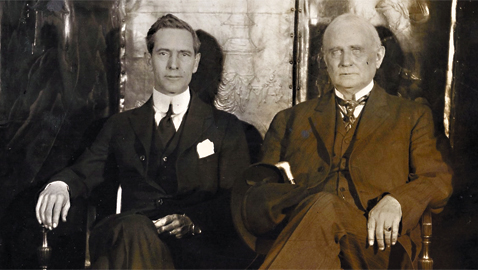
From the author’s personal collection.
Under Secretary of State Breckinridge Long of Missouri (left) sitting with ex-Speaker of the House Champ Clark, 1920.
Long since forgotten by most, James Beauchamp Clark was a highly respected and popular Democrat from Missouri. And he came within a whisker of becoming president of the United States.
Born March 7, 1850, Clark was a native of Lawrenceburg, Kentucky. Apparently his mother was related to the infamous Jereboam Beauchamp, who was both a killer and an attorney. Beauchamp was involved in a sordid tale of love and murder. A Kentucky state legislator named Solomon Sharp had been in some sort of a relationship with a woman named Anna Cook. Evidently Ms. Cooke became pregnant and she promptly pointed the finger of responsibility at Solomon Sharp as being the father of the child, which was illegitimate. Sharply hotly denied paternity and apparently most folks believed him, causing Anna Cooke to seethe with anger. Miss Cooke was not without suitors, as a few years later she married Jereboam Beauchamp, who was at least some sixteen years younger than his bride. Sharp was campaigning for a seat in the Kentucky legislature and political opponents revived the charges he was the father of Anna Cooke’s child with one new added twist: the child in question was of mixed race. That particular accusation positively unhinged Anna Cooke Beauchamp, who demanded her twenty-three year old husband promptly kill Solomon Sharp. Impressionable and eager to defend his wife’s honor, Jereboam Beauchamp lured Sharp into opening the door of his home and murdered him by stabbing him to death. Beauchamp was arrested, tried for the murder of Solomon Sharp, convicted and sentenced to death.
Before Beauchamp could be hanged, his wife came to visit him in prison and had smuggled in a knife. Anna Cooke Beauchamp intended for them to commit suicide together and while she did kill herself, her young husband was not so lucky. Beauchamp’s jailer hurried him to the hangman’s noose before he could bleed out and hung him.
The couple had requested to be buried in the same grave, locked in an embrace for all ternary, which is precisely how they were buried.
The name never inhibited Clark, who became known as “Champ”. Young Champ Clark went to West Virginia to attend Bethany College and earned his law degree from the Cincinnati School of Law. Clark left his native Kentucky and moved to Missouri in 1875. The young lawyer made his home in Bowling Green, Missouri and the old family home still stands there today.
Champ Clark proved to be a compelling speaker and excellent orator. He also had a strong and impressive physical appearance. Clark won his first political race in 1892, winning a seat in Congress. Clark was not so lucky when he sought reelection in 1894, losing to Republican William M. Treloar in a year that saw a GOP sweep. Most Republicans had not believed Clark could be beaten and Treloar was hardly the first choice or even second choice of most Republican leaders to be a candidate against the Congressman. After winning the election, Treloar was scorned by many local newspapers who ridiculed the new Congressman’s abilities and profession. Champ Clark spoke up and defended his opponent. Clark was a gracious man in both victory and defeat.
Despite having defended William Treloar, Champ Clark intended to reclaim his seat in the House of Representatives and was a candidate again in 1896. Clark won the election and stayed in Congress until the day he died.
Champ Clark was a very ambitious man and sought to become the House Majority Leader in 1903, but was defeated by Congressman John Sharp Williams, a hard drinking and witty man from Mississippi. It was only a momentary setback, as Williams was also an ambitious man and was elected to the United States Senate in 1908. Clark ran for Majority Leader again in 1909 and won.
Champ Clark’s tenure as Minority Leader was a brief one, as the Democrats won the 1910 elections and he was elected Speaker of the House in 1911. That same year Clark made a notable speech on the House floor, which revealed his expansionist views. Evidently Champ Clark would have added Canada as part of the United States, if he could manage it. The reaction of Canadians to Clark’s speech was less than enthusiastic. They threw out the government negotiating a treaty with the United States as a result.
Clark’s upward trajectory politically continued and he was a candidate for the 1912 Democratic president nomination. It was a good year to be a Democrat and just about any Democratic nominee appeared to have a very real chance of being elected as the Republicans were busy tearing themselves apart. The incumbent president, William Howard Taft, was being challenged in the primaries by his predecessor and former close personal friend, Theodore Roosevelt. TR, still wildly popular with millions of Americans, humiliated Taft in a series of primary elections; even beating Taft in his home state of Ohio. The contest devolved into a brawl and name-calling contest, mostly by Roosevelt, who called the president a “puzzle-wit” and “fat head.”
The power of incumbency was still strong and the sharp divide between progressive Republicans, who largely supported Roosevelt, and the conservatives, who were solidly behind Taft, imploded after President Taft just barely managed to receive the nomination. Taft’s nomination was aided considerably by solid support from Southern states, where there were hardly any Republicans at all. Roosevelt’s supporters immediately cried theft, claiming the nomination had been stolen from the former president. TR’s backers immediately bolted and held a rump convention and formed the “Progressive Party”, but they were popularly nicknamed the “Bull Moose” party due to Roosevelt’s random comment that he felt as hardy as a bull moose. Roosevelt accepted the Progressive party nomination and the presidential election would be a three-way race. The split in the Republican party, which had dominated presidential elections since 1860, virtually assured the Democrats of winning back the White House.
Champ Clark’s own presidential campaign was faring well and he had won more than a few presidential primary contests himself. Clark came into the Democratic National Convention with almost a majority committed to him. Clark faced competition from a few strong candidates, including New Jersey governor Woodrow Wilson, Indiana governor Thomas R. Marshall, Ohio governor Judson Harmon, and Congressman Oscar W. Underwood of Alabama.
As the delegates assumed their places in Baltimore, Speaker Clark fully expected to emerge from the convention as the Democratic party’s presidential nominee. Unfortunately for Clark, the party’s own rules required a nominee to have fully two-thirds of the delegates, not a mere majority. The first ballot revealed the strengths and weaknesses of the various candidates. Clark won 440 1/4 votes on the first ballot, with Governor Woodrow Wilson trailing in second place with 324 votes. Judson Harmon was a distant third with 148 votes and Congressman underwood limped along with 117 1/4 votes.
Quite frequently, the leading candidate was the beneficiary of a bandwagon effect when it became clear a particular candidate was well ahead, but Champ Clark received no such support. By the ninth ballot, votes finally began changing and New York fell into the Speaker’s column. While it certainly increased Clark’s delegate count, a few delegates were appalled by the support given the Speaker by New York’s Tammany Hall political organization, which was viewed as venal and corrupt by many Democrats and virtually every Republican in the country. The support of New York state gave the Speaker an absolute majority in the balloting, but more importantly, it gave a certain Democrat an excuse to defect. That Democrat was William Jennings Bryan.
Bryan was perhaps the best-known Democrat in the country; he was also very likely the most well loved Democrat in the country, as well as the most profoundly hated Democrat in the country. Three times Bryan had won the Democratic presidential nomination and carried his party’s banner in the general election, only to lose each time. Bryan, as a young and untested Congressman, had electrified the 1896 Democratic National Convention with his “Cross of Gold” speech. The delegates rewarded him by nominating him to run against the Republican nominee, William McKinley of Ohio.
Bryan got the floor and made a speech denouncing Champ Clark and Tammany Hall. Bryan now claimed the Speaker had become the candidate of the special interests and Wall Street as he had the backing of Tammany Hall. Bryan had actually been elected as a delegate to the convention from his state of Nebraska as a Clark supporter. Despite his loudly proclaimed religious convictions, the rotund orator had no scruples about shedding his support of Champ Clark and more than a few speculated Bryan was hoping for a fourth presidential nomination for himself. Bryan threw his support to the governor of New Jersey, Woodrow Wilson.
Wilson had believed his chances for the nomination had withered and died. In fact, at the time of Bryan’s perfidy, Wilson was preparing to release his delegates, an instruction his convention managers wisely ignored. Bryan’s speech tilted the convention, not in his own favor, but that of Woodrow Wilson. Speaker Clark had been urged to go to Baltimore in person, as it was believed he could have rallied his supporters to him. Clark rejected the advice and years later his son, Bennett Clark, would lament it was his father’s greatest single political mistake in his career. Speaker Clark watched from Washington, D. C. as his support melted away and Woodrow Wilson became the nominee of the Democratic party for president of the United States.
Clark’s son was originally named Joel Bennett Clark. Young Bennett worked as a House parliamentarian during his father’s time as Speaker. Bennett would change his name to Bennett Champ Clark to honor his father and would be elected to the United States Senate in 1932 and serve two terms before being defeated. Senator Bennett Champ Clark would also honor his father yet another way; he became the champion of eliminating the rule requiring a presidential nominee to have the support of two-thirds of the delegates. Bennett Clark finally succeeded in changing the rules at the 1936 Democratic National Convention. Henceforth, the Democratic nominee needed a majority of the delegates to win the nomination. Bennett Clark also retained a burning hatred of William Jennings Bryan for the rest of his life.
Champ Clark was sorely disappointed by his failure to win the presidential nomination of his party and he remained Speaker of the House following the election of Woodrow Wilson in 1912. Speaker Clark loyally supported most of the Wilson administration’s goals and legislation. Clark had skillfully united Democrats in opposing the policies of William Howard Taft and brought that same skill to keeping his fellow Democrats united to help Wilson. There was one notable exception to Champ Clark’s support for the Wilson administration; he refused to go along with President Wilson’s declaration of war against the German Empire in 1917. Clark, who represented a large German-American constituency, balked; furthermore, the Speaker was not convinced it was America’s war. Missouri’s powerful senior U. S. senator, William J. Stone, also refused to vote to declare war.
Ironically, it was Woodrow Wilson who inadvertently helped to reverse the Democratic majorities in Congress. Wilson, obsessed with the peace in Europe following World War I and American participation in the League of Nations, wearied the American people with his political agenda. Wilson made a special call for the election of a Democratic Congress in 1918 and was stunned when the American people rejected his plea and restored the Republicans to power. Former president Theodore Roosevelt, who deeply loathed Woodrow Wilson, chortled it was a clear rejection of Wilson and his policies, as it was.
In 1919, Champ Clark’s eight year reign as Speaker of the House came to an end, although he still held his seat in the House of Representatives. With a period of six years, Champ Clark had gone from almost being elected president of the United States, lost the Speakership, and now sat in the House as a mere Congressman. The worst was yet to come.
Seventy years old in 1920, Champ Clark began his last campaign, seeking reelection to Congress. Clark was not at all worried, his Republican opponent, Theodore Hukriede, was little known and no real threat. Clark miscalculated; the 1918 was a warning of just how tired the American people were of Woodrow Wilson’s administration. The GOP won in a tidal wave in 1920, which took Champ Clark under.
Clark was barely able to believe the people of his own district had turned him out of office. It was a sad end to a long and distinguished political career. It was also the end of Champ Clark’s life. Heartbroken by his loss, Clark died on March 2, 1921, just a day before he would leave Congress.
There are still vestiges of Champ Clark’s life, especially in Missouri. The rambling home the Speaker built in Bowling Green still stands, his papers have been preserved, and there is a statue of the Speaker. Champ Clark was a formidable and patriotic man and yet another example throughout our history of just what might have been.






